What's Mine Is Yours: The Rise of Collaborative Consumption
WHAT’S MINE IS YOURS is about Collaborative Consumption, a new, emerging economy made possible by online social networks and fueled by increasing cost consciousness and environmental necessity. Collaborative Consumption occurs when people participate in organized sharing, bartering, trading, renting, swapping, and collectives to get the same pleasures of ownership with reduced personal cost and burden, and lower environmental impact.\ The book addresses three growing models of Collaborative...
Search in google:
WHAT’S MINE IS YOURS is about Collaborative Consumption, a new, emerging economy made possible by online social networks and fueled by increasing cost consciousness and environmental necessity. Collaborative Consumption occurs when people participate in organized sharing, bartering, trading, renting, swapping, and collectives to get the same pleasures of ownership with reduced personal cost and burden, and lower environmental impact. The book addresses three growing models of Collaborative Consumption: Product Service Systems, Communal Economies, and Redistribution Markets. The first, Product Service Systems, reflects the increasing number of people from all different backgrounds and across ages who are buying into the idea of using the service of the product-what it does for them-without owning it. Examples include Zipcar and Ziploc, and these companies are disrupting traditional industries based on models of individual ownership. Second, in what the authors define as Communal Economies, there is a growing realization that as individual consumers, we have relatively little in the way of bargaining power with corporations. A crowd of consumers, however, introduces a different, empowering dynamic. Online networks are bringing people together again and making them more willing to leverage the proverbial power of numbers. Examples of this second category include Etsy, an online market for handcrafts, or the social lending marketplace Zopa. The third model is Redistribution Markets, exemplified by worldwide networks such as Freecycle and Ebay as well as emerging forms of modern day bartering and “swap trading” such as Zwaggle, Swaptree, and Zunafish. Social networks facilitate consumer-to-consumer marketplaces that redistribute goods from where they are not needed to somewhere or someone where they are. This business model encourages reusing/reselling of old items rather them throwing them out, thereby reducing the waste and carbon emissions that go along with new production. WHAT’S MINE IS YOURS describes how these three models come together to form a new economy of more sustainable consumerism. Collaborative Consumption started as a trend in conjunction with the emergence of shared collective content/information sites such as Wikipedia and Flickr and with the recent economic troubles and increasing environmental awareness, it is growing into an international movement. The authors predict it will be a fully fledged economy within the next five years. In this book the authors travel among the quiet revolutionaries (consumers and companies) from all around the world. They explore how businesses will both prosper and fail in this environment, and, in particular, they examine how it has the potential to help create the mass sustainable change in consumer behaviors this planet so desperately needs. The authors themselves are environmentalists, but they are also entrepreneurs, parents, and optimistic citizens. This is a good news book about long-term positive change. Publishers Weekly Business consultant Botsman and entrepreneur Rogers track the rise of a fascinating new consumer behavior they call "collaborative consumption." Driven by growing dissatisfaction with their role as robotic consumers manipulated by marketing, people are turning more and more to models of consumption that emphasize usefulness over ownership, community over selfishness, and sustainability over novelty. A number of new businesses have emerged to serve this new market, exploiting the ability of the Internet to create networks of shared interests and trust and to simplify the logistics of collective use. Businesses such as bike-sharing service BIXI; toy library BabyPlays; solar power service SolarCity; and the Clothing Exchange, a clothing swap service, help users enjoy products or services without the expense, maintenance hassle, and social isolation of individual ownership. Part cultural critique and part practical guide to the fledgling collaborative consumption market, the book provides a wealth of information for consumers looking to redefine their relationships with both the things they use and the communities they live in. (Oct.)
Introduction: What's Mine Is YoursPART 1 CONTEXTOne Enough Is Enough 3Two All-Consuming 19Three From Generation Me to Generation We 41PART 2 GROUNDSWELLFour The Rise of Collaborative Consumption 67Five Better Than Ownership 97Six What Goes Around Comes Around 123Seven We Are All in This Together 153PART 3 IMPLICATIONSEight Collaborative Design 185Nine Community Is the Brand 199Ten The Evolution of Collaborative Consumption 211Acknowledgments 227Interviewees 231Collaborative Consumption Hub 235Selected Bibliography 237Notes 243Index 269
\ Publishers WeeklyBusiness consultant Botsman and entrepreneur Rogers track the rise of a fascinating new consumer behavior they call "collaborative consumption." Driven by growing dissatisfaction with their role as robotic consumers manipulated by marketing, people are turning more and more to models of consumption that emphasize usefulness over ownership, community over selfishness, and sustainability over novelty. A number of new businesses have emerged to serve this new market, exploiting the ability of the Internet to create networks of shared interests and trust and to simplify the logistics of collective use. Businesses such as bike-sharing service BIXI; toy library BabyPlays; solar power service SolarCity; and the Clothing Exchange, a clothing swap service, help users enjoy products or services without the expense, maintenance hassle, and social isolation of individual ownership. Part cultural critique and part practical guide to the fledgling collaborative consumption market, the book provides a wealth of information for consumers looking to redefine their relationships with both the things they use and the communities they live in. (Oct.)\ \ \ \ \ Tony Hsieh"What can the next wave of collaborative marketplaces look like? Botsman and Rogers answer this question in a highly readable and persuasive way. Anyone interested in the business opportunities and social power of collaboration should consider reading this book."\ \ \ Craig Newmark"People are normally trustworthy and generous, and the Internet brings the good out far more than the bad. We’re seeing an explosion of modest businesses where people help each other out via the Net, and What’s Mine is Yours tells you what’s going on, and inspires more of the same."\ \ \ \ \ Adam Gopnik"Rachel Botsman and Roo Rogers have offered a convincing, charming and in every sense collaborative account of how the new networks that have disrupted our lives are also likely to alter them, and entirely for our good."\ \ \ \ \ Steven Johnson"Amidst a thousand tirades against the excesses and waste of consumer society, What’s Mine Is Yours offers us something genuinely new and invigorating: a way out. Anyone interested in the emerging economics and culture of collaboration will want to read this profoundly hopeful book."\ \ \ \ \ Delta Sky"This is an inspiring book about innovating entrepreneurs in an economy where people are seeking ways to connect with each other- through business."\ \ \ \ \ Vogue Australia"The latest buzzword and trend is defining how we do business in the new millennium"\ \ \ \ \ Emergent by Design"The authors give hundreds of examples of how people are finding new ways to share and exchange value…[T]he book is packed with some pretty interesting statistics…If you’re unaware of what’s happening in the peer-to-peer exchange space, this book will quickly bring you up to speed."\ \ \ \ \ The Australian"[F]ull of impressive examples of entrepreneurs establishing new markets. Ultimately, the authors’ optimism is infectious."\ \ \ \ \ The Economist"Collaborative consumption is an ideal signalling device for an economy based on electronic brands and ever-changing fashions."\ \ \ \ \ Edwards Magazine Bookclub"[T]he authors have laid out the social and economic logic for collaborative consumption with such religious fervour and zeal that one can’t help but become converted to this new world order."\ \ \ \ \ Library JournalRachel and Roo (same name as the newest NBC sitcom, oddly) define collaborative consumption as "bartering, lending, trading, renting, gifting, and swapping, redefined through technology and peer communities." It's that age-old activity-sharing-with coworkers, neighbors, your FB peeps, whomever. For something so simple, it sure is popular, profitable for businesses, and good at reducing waste and saving money, leading me to the conclusion that it must have been the forgotten brainchild of Jimmy Carter and Buckminster Fuller. And though the authors slant healthily toward reducing our throwaway culture (how many Styrofoam cups did you use today, boy?), they are not ideologues on an anticapitalist rant. I see the movement as dude-friendly, as it presents solutions that fit the needs of most. Perhaps the best aspect of the book is what it isn't: a dumbed-down pastiche of self-help and personal economizing. If you've ever traded your mad computer skillz for help building a deck, you did collaborative consumption. This book introduced me to dozens of sites that will save me dinero the next time I need something free (Freecycle, OurSwaps, SwapTree), have to rent something for cheap (Zilok), or borrow money (Zopa) to go to Argentina (Airtobnb, CouchSurfing). Just don't lend your copy to the hoarder who lives down the street. He doesn't need more crap. — Douglas Lord, "Books for Dudes," Booksmack! 2/3/11\ \ \ \ \ From the Publisher"A convincing, charming and in every sense collaborative account of how the new networks that have disrupted our lives are also likely to alter them, and entirely for our good." —-Adam Gopnik, author of Paris to the Moon\ \ \ \ \ Library JournalBusiness consultant Botsman and entrepreneur Rogers (director, Redscout Ventures) tout the benefits of access to products and services without the cost, burden, or responsibility of ownership. Their coined notion of "collaborative consumption" is beyond the toy sharing we learned in childhood. Citing dozens of examples from across the world, they look at how businesses like Netflix, Zipcar, Zopa, and Swaptree are revolutionizing the exchange, value, and creation of goods and services through networked technology and peer communities. Veteran narrator Kevin Foley delivers an effective performance of this fascinating and timely book; business community leaders will want multiple listens. [More at www.collaborativeconsumption.com.—Ed.]—M. Gail Preslar, Eastman Chemical Co. Business Lib., Kingsport, TN\ \








